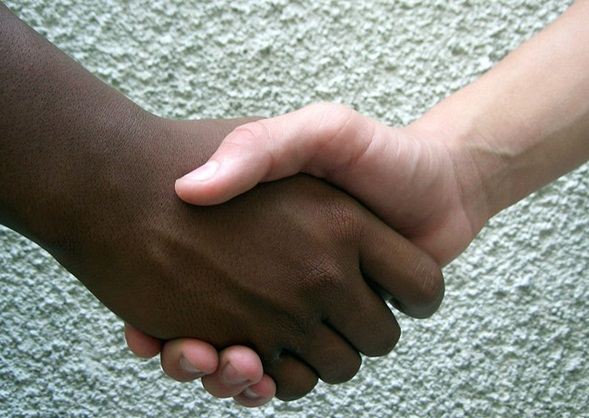In the last article, we saw that excellence in any field can be studied and copied, and that NLP (neurolinguistic programming) is a well established and effective way of doing this. Success in any area – be it career, family, business, politics or anything else – is largely a matter of building relationships. People who are able to develop and maintain good, mutually productive relationships with other people tend to be much more successful than those who don’t do this.
Building good relationships does come more easily to some people, but it is a skill that can be developed, and NLP offers a number of perspectives and tools to enable you to do so.
You cannot not communicate
Communication never stops. Whenever there is any social contact, there is communication. When a couple have a fight and stop talking, they are communicating their anger and frustration. When a teenager shuts himself in his room and won’t come out, he is communicating to his parents. Even in more neutral situations, people are communicating by virtue of their body language and eye movements.
Simply being aware of this can make a huge difference to your relationships. Much of our own communication with others is non-verbal and unconscious. We send out signals all the time without even knowing what we are doing. Becoming aware of the way we are communicating with other people is a vital first step in improving our relationships. Anthony de Mello, in his remarkable book, Awareness, writes that awareness can change your life. If you do nothing else, becoming more conscious of the way to interact with other people will make an enormous difference to the quality of your relationships.
Other people’s models of the world are not wrong
We have a tendency to think that our way of seeing things is right, that it corresponds to reality.. But NLP reminds us that we see every experience through a set of filters – values and expectations – which have been built up over the course of our lives. Once we understand this, it can be easier to understand other people’s behaviour – they do not see the world as we do; they use different maps or models of the world; they see things through different lenses, and so they behave differently.
One of Steven Covey’s famous ‘seven habits of highly effective people’ is seek first to understand and then to be understood. In NLP, we are reminded that the map is not the territory. Instead of defending your own map, seek to understand and learn from the maps which other people use to navigate through the world.
The person with the most flexible behavior will control the situation
In nature, animals and plants which are able to adapt most quickly to their environment are likely to survive; businesses which can change quickly to take account of shifting economic or social environments are more successful. The same is true of individuals.
Returning to the ‘map’ analogy, a person who can switch between different maps will be able to communicate more effectively with a wider range of people and so will be more effective at establishing good relationships. People who stick rigidly to one way of seeing things and one way of behaving in any given situation will become isolated and irrelevant as situations change.
The meaning of communication is the response it produces
Often, we blame others for not understanding our message. NLP offers a new perspective: we are responsible for getting a message across and so, if we fail to do so, we need to change the way we communicate. Once again, this is all about flexibility – to get a message across, you need to speak in the other person’s terms, understand her world, get to know what drives and concerns her. You need to put your own perspective aside, as far as you can.
Someone I know who is responsible for leading an organization has recently had great success in moving the organization foreword by using Facebook as a way to communicate. He does not like Facebook and would rather not use it, but he realizes that, given the age profile of the people in the organization, he needs to use the most effective platform he can to get his message across. Since introducing the new Facebook group, communication and participation have improved enormously.
Communication is always about you, the communicator. If the message has not got through, then you need to change the way it is delivered.
Everyone does the best they can with the resources available to them
When a small child falls over, he usually starts to cry or scream. He does this because he has no other resources available to him. He knows from experience that crying will attract the attention of his mother, who will help him. As adults, we behave in more sophisticated and complex ways, but the same principle holds – we do what we believe will bring about the best results. In NLP, it is often said that every behavior has a positive intention.
Developing excellent relationships is often about understanding why people behave the way they do, not from our perspective, but from theirs, and helping them to find a more productive behaviour by giving them new resources. Everyone is doing the best they can, given what they have. Often, the best thing you can do for someone is give them new tools. It is rarely helpful, in the long run, to solve people’s problems for them, but providing them with the ability to do so will strengthen your relationship.
You are in control of your mind and hence your results
NLP is all about taking personal responsibility and tells us that we are always operating from one of two perspectives – cause or effect. When ‘at cause,’ we see ourselves as being in control of our experience and able to change things to improve our situation. When ‘at effect,’ we blame others or our circumstances to justify why we are not more successful, healthy or happy. But the truth is that, whether at cause or at effect, we are always in control – we are making the choice about which perspective to operate from.
If a relationship is going badly, the best approach is always to think about your own behaviour and how to change it. At a position of ‘cause,’ you have the ability to improve things – by seeking to understand the other person’s perspective, by listening to them, using their terms of reference and communicating on their level.
People are not their behaviors
It is a core assumption of NLP that people do the best they can with what they have. It is what they have – their resources – which determines their behaviour. If they had more or different tools, or had a different perspective, then they may well behave differently.
Never label people based on their behaviour. This is not helpful in developing good relationships. Behaviour changes all the time as we learn and grow. Bad, unproductive and ‘stuck’ relationships can be turned around when we take responsibility and learn to be proactive.
Viktor Frankl, a holocaust survivor, wrote in his book Man’s Search For Meaning that ‘between stimulus and response there is a gap, and in that gap lies all our freedom.’ We are all capable of remarkable things. We are all able to achieve success and fulfilment. The good news – and the most frightening thought – is that we are responsible.
Photo by ruurmo





Hey Mark,
You’re absolutely right here. Some people make the mistake of viewing others in a light that, in reality, is not who they really are. That judgement is actually just a reflection of their own thoughts created in their mind. And those thoughts are in no way connected to the current situation or event.
I’m saying this because I am no exception to that statement.
This was a great post. Thanks!
Brandon
I love living in the gap and yes we are all responsible!
Great post and very insightful.
Living in the possibilities,
Nancy
these few days I’ve been dealing with RSVPs for my wedding. I got annoyed at how some people responded. But y friend reminded me of exactly the same thing – I can’t judge others using my model of the world as you say. They have their reasons, i dont have to put myself down, but I shouldn’t box them up either!
Noch NOch
Hi Mark thank you for sharing with us this valuable information.
When I studied NLP I was very surprised on how well I was able to establish better ways to communicate and building relationships.
I remember when having completed my NLP master programmes how much better I was able to lead conversations and assist people more with their own thinking and behavioural patterns which were not supporting them.
Personal responsibility certainly involves an awareness on how ones behaviour has an impact on others.
NLP certainly reminds us of the fundamentals of communication and leadership of oneself . So thanks Mark for reminding us of the most important concepts of effective communication and personal responsibility
.
i like the para with heading “People are not their behaviors”. i like the thought and try to implement in my life to improve my relationships with others.
thanks harrison.
How do you communicate with someone who is giving you silence? By leaving them alone?
I’ve exactly the same question as of Maya. Will pacing and then leading work here? What else could be done?